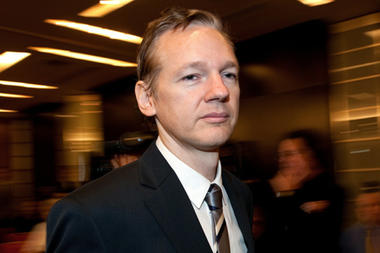WikiLeaks ready to drop a bombshell on Russia. But will Russians get to read about it?
WikiLeaks is about to release documents on Russia, but the tightly-controlled Russian media is unlikely to report them the way Western media attacked the documents about Afghanistan and Iraq

WikiLeaks founder Julian Assange arrives for a press conference Oct. 23 at the Park Plaza hotel in central London to release previously secret files on the Iraq war. Mr. Assange said WikiLeaks will release information on Russia soon.
(Leon Neal/AFP Photo/Newscom)
The Kremlin had better brace itself for a coming wave of WikiLeaks disclosures about Russia, the website's founder, Julian Assange, told a leading Moscow newspaper Tuesday.
"We have [compromising materials] about Russia, about your government and businessmen," Mr. Assange told the pro-government daily Izvestia. "But not as much as we'd like... We will publish these materials soon."
He then dropped a hint that's likely to be nervously parsed in Russia's corridors of power: "We are helped by the Americans, who pass on a lot of material about Russia," to WikiLeaks, he said.
FIVE BOMBSHELLS from WikiLeaks' Iraq war documents
Russian security experts say there probably won't be anything comparable to the huge archives of US military secrets from the wars in Afghanistan and Iraq that the website has recently published.
'A lot of interesting facts' about Russia
Assange and another WikiLeaks spokesperson, Kristinn Hrafnsson, who talked to the daily Kommersant Tuesday, refused to provide details. "Russians are going to find out a lot of interesting facts about their country," Ms. Hrafnsson told Kommersant, adding that WikiLeaks would soon be targeting "despotic regimes in China, Russia, and Central Asia" in a series of fresh document dumps.
"If they are going to disclose details of secret bank accounts and offshore businesses of the Russian elite, then the effect will be shocking," says Stanislav Belkovsky. president of the Kremlin-connected Institute of National Strategy. "Most Russians believe that political leaders and others have siphoned off billions of dollars into foreign accounts, but proof of something like that would be dynamite."
Will Russia see it in the media?
But nobody should expect the tightly-controlled Russian media to report on any WikiLeak revelations about Russia in the thorough manner that Western media have analyzed the huge troves of documents about Afghanistan and Iraq, says Sergei Strokan, foreign affairs columnist with Kommersant.
"You can expect minimal coverage, without any dangerous details, from major Russian news organizations," he says. "Of course there are independent print publications, and the Internet, where it might get picked up and discussed. But there will be no national discussion, no wider repercussions. This is not a country where media disclosures can lead to political changes."
In fact, a US-based website recently published a huge trove that purported to be secret operational documents of Russia's FSB security service, and no one in Russia even noticed, says Andrei Soldatov, editor of Agentura.ru, an online journal that reports on the secret services.
"Unlike what happens in the US, no Russian journalists even mentioned these materials, which included reports of FSB operations in Ukraine, Turkmenistan, and other countries," says Mr. Soldatov. "No reporters asked the FSB any questions; there was no independent process that might have determined the validity of the documents, or what significance they might have for the Russian public. Nothing at all."
The documents, stamped "top secret," were posted last June on Lubyankapravda.com, a website hosted in the US and registered in Egypt, and mysteriously taken down three weeks later. Visitors now find only a message saying the site is "under construction."
An English translation of Soldatov's article about the episode can be found here.
Mr. Strokan says it's not surprising that "American sources" might be ready to dish up Russian secrets for publication on WikiLeaks.
"It's a whole new world of kompromat [a Russian expression meaning 'compromising materials'] out there," he says. "There are political interests all over the world watching this, and it's dawning on them that WikiLeaks is a powerful new tool for wielding influence or undermining a competitor.
"We're going to see a lot more of this."





















